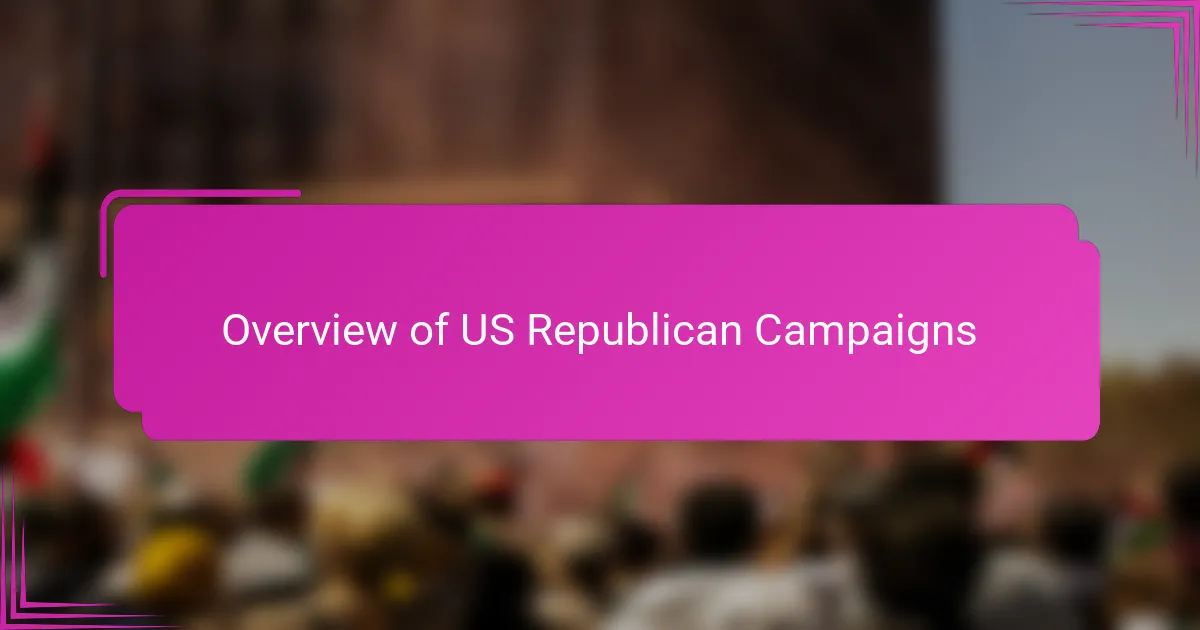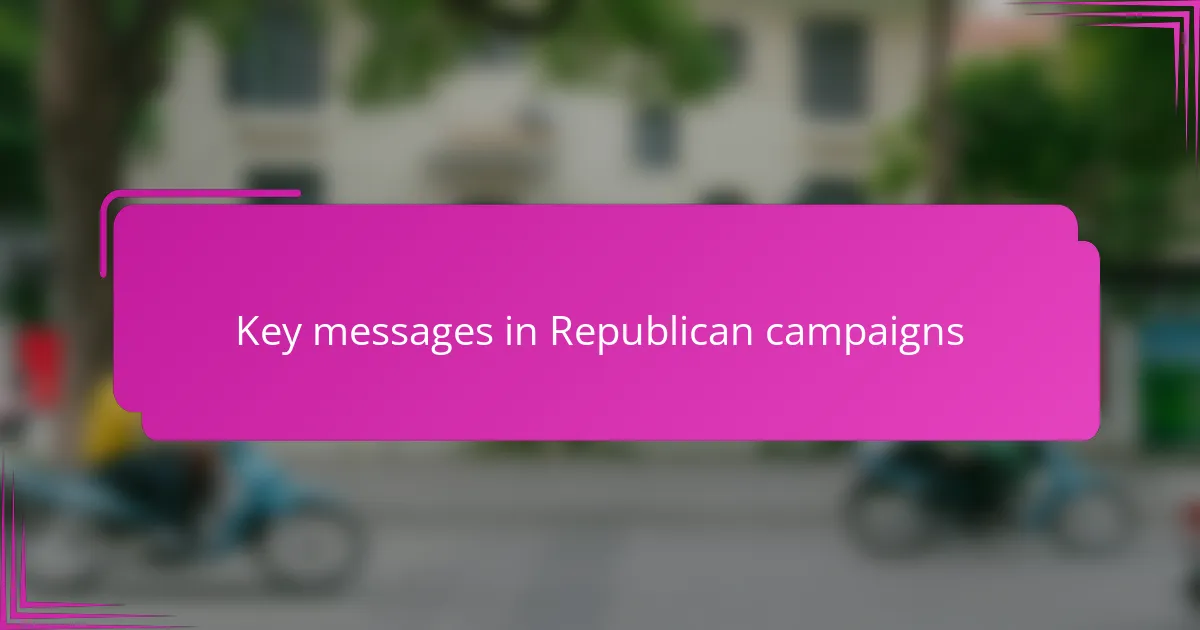Key takeaways
- Goldwater’s 1964 campaign emphasized limited government and individual liberty, shaping the Republican Party’s conservative identity.
- The campaign illustrated the tension between ideological purity and broad electoral appeal, posing challenges that remain relevant today.
- Goldwater’s messaging resonated with voters’ fears and hopes during the Cold War, showcasing the importance of cultural context in political campaigns.
- His approach galvanized a core conservative base while risking alienation of moderate voters, highlighting the balancing act in campaign strategies.

Overview of US Republican campaigns
US Republican campaigns have always fascinated me because they blend tradition with innovation in unique ways. From energetic grassroots efforts to high-stakes media strategies, these campaigns reveal a lot about the party’s evolving identity. Have you ever wondered how messaging shifts to reflect changing times while still holding onto core principles?
In my experience, what makes Republican campaigns stand out is their ability to rally diverse coalitions under broad themes like economic freedom and national security. This balancing act isn’t easy—juggling local and national interests often creates tension that shapes the campaign narrative. I find that these internal dynamics offer a window into the party’s priorities and challenges.
Sometimes, I reflect on how historical moments deeply influence campaign tactics. For example, during crises or social upheaval, campaigns might pivot sharply to address voters’ anxieties or hopes. This responsiveness feels like the heartbeat of Republican campaigns, constantly adapting while trying to remain authentic and compelling.

Key messages in Republican campaigns
What strikes me about key messages in Republican campaigns is how they consistently emphasize individual responsibility and limited government. This focus isn’t just political jargon—it connects with many voters’ desire for personal freedom and self-reliance. Have you noticed how slogans like “smaller government” often serve as a rallying cry, capturing complex ideas in just a few words?
In my observation, these campaigns also lean heavily into themes of patriotism and law and order, especially when national security feels threatened. I remember watching coverage during tense times, sensing how candidates use emotional appeals to tap into voters’ sense of safety and pride. It’s fascinating how these messages resonate differently depending on the historical moment.
Another thing I find compelling is the Republican use of economic optimism, promising prosperity through free markets and lower taxes. From my viewpoint, this message offers hope and a vision for upward mobility—something that feels very tangible to many Americans. It makes me wonder: how do these economic promises shape voter trust across different regions and demographics?

Historical background of 1964 US election
The 1964 US election unfolded against a backdrop of profound social and political change. I recall reading about how the nation was grappling with civil rights tensions and the shadow of the Cold War, which made the stakes incredibly high for both parties. It’s striking to think how these pressures shaped voter anxieties and hopes in ways that still resonate today.
What really stands out to me is the incumbent President Lyndon B. Johnson’s push to continue Kennedy’s legacy, especially in advancing civil rights, while contending with a deeply divided country. I often wonder how voters balanced their desire for progress with fears of rapid social change. This tension gave the election a charged, almost personal feel for many Americans.
Meanwhile, Barry Goldwater’s campaign stirred a different kind of energy—a fervent call for limited government and a tough stance on communism. Reflecting on this, I see how his message tapped into a growing conservative movement that questioned the status quo. It makes me ask: how did this clash of visions shape the future trajectory of American politics?

Goldwater’s campaign message explained
Goldwater’s campaign message was unmistakably clear: a fierce commitment to limited government and individual liberty. I remember thinking how bold it was at the time to reject the prevailing consensus on federal expansion, especially during an era marked by social programs and civil rights legislation. Have you ever considered how such a stark emphasis on shrinking government could both inspire a base and alienate moderate voters?
What really fascinates me is how Goldwater framed his stance as a defense against creeping socialism and communism, tapping into Cold War anxieties with a sharp, uncompromising tone. From my perspective, this was more than policy—it was a cultural statement signaling a new brand of conservatism, one that prized personal responsibility over collective solutions. It made me wonder how voters reconciled this tough rhetoric with the urgent calls for social change happening around them.
At the heart of his message was a call to reclaim America’s founding principles, especially individual freedom and constitutional purity. Reflecting on this, I feel that Goldwater’s appeal lay in its clarity and conviction, even if it sacrificed moderate support. Doesn’t it make you think about the balance between ideological purity and political pragmatism—something every campaign must grapple with?

Impact of Goldwater’s message on the party
Goldwater’s message shook the Republican Party in a way that still echoes in my mind. His unapologetic embrace of limited government and rugged individualism galvanized a core group of conservatives who felt overlooked by the party’s more moderate leadership. I remember thinking, this was the moment when a clear, uncompromising conservative identity started to take shape, setting the stage for decades of political realignment.
At the same time, Goldwater’s stance exposed sharp divisions within the party. I find it fascinating how his campaign forced Republicans to confront the tension between ideological purity and broad electoral appeal—a challenge that feels surprisingly familiar even today. Didn’t it make you wonder how a party can stay true to its principles while still winning elections?
What strikes me most is how Goldwater’s influence pushed the Republican Party toward a more confrontational, activist posture. From my experience studying later campaigns, I see his legacy in the party’s shifting rhetoric and priorities, especially on national defense and social issues. It’s almost like his 1964 campaign was a spark that ignited a larger movement, reshaping the party’s soul in profound ways.

Personal analysis of Goldwater’s campaign
Goldwater’s campaign felt to me like a bold experiment in political messaging—one that didn’t shy away from controversy but rather embraced it. I recall wondering whether such a staunch commitment to limited government was ahead of its time or simply too rigid for the broader electorate. It’s a vivid reminder of how taking a firm stand can both inspire passion and provoke resistance.
What really struck me was Goldwater’s unapologetic bluntness. From my perspective, his campaign seemed less about winning over the center and more about energizing a distinct ideological base. Have you ever thought about how that kind of strategy shapes a party’s future beyond just a single election cycle? It clearly planted seeds for the conservative movement we still see today.
At moments, I found myself reflecting on the emotional weight behind his messaging—the fear of government overreach, the desire for personal freedom, and the looming Cold War threat. These weren’t just abstract ideas; they resonated deeply with certain voters, even if they alienated others. It made me appreciate how campaign messages carry real burdens and hopes for millions of people.

Lessons learned from Goldwater’s campaign
One lesson I gleaned from Goldwater’s 1964 campaign is the power—and risk—of ideological clarity. His unwavering stance on limited government energized a core group of conservatives, but I often wonder if that same clarity made it harder to connect with a wider audience. Have you noticed how campaigns that double down on a strong principle can sometimes polarize more than persuade? I’ve seen in my own observations that this sharp focus can both rally a base and limit broader appeal.
Another takeaway is how Goldwater’s message forced the Republican Party to reckon with internal divisions. Watching that campaign unfold, I sensed a party at a crossroads between maintaining ideological purity and embracing political pragmatism. It made me think: how does a party balance these competing demands without losing its identity? From what I’ve studied, this tension still challenges Republicans today, reflecting the long shadow of Goldwater’s approach.
Finally, Goldwater’s campaign underlined for me the importance of timing and cultural context in messaging. His call for personal freedom and resistance to government overreach tapped into Cold War fears that felt very real then. I recall reflecting on how much a campaign’s success depends not just on ideas, but on connecting emotionally with what voters fear or hope for in that moment. Can we truly separate policy from the mood of the times? Goldwater’s experience suggests we cannot.